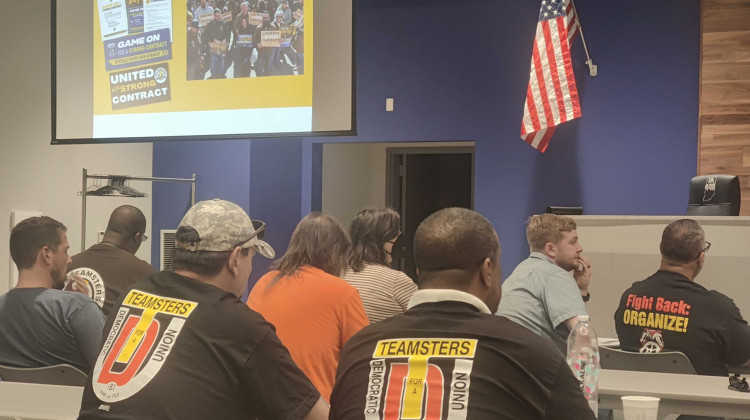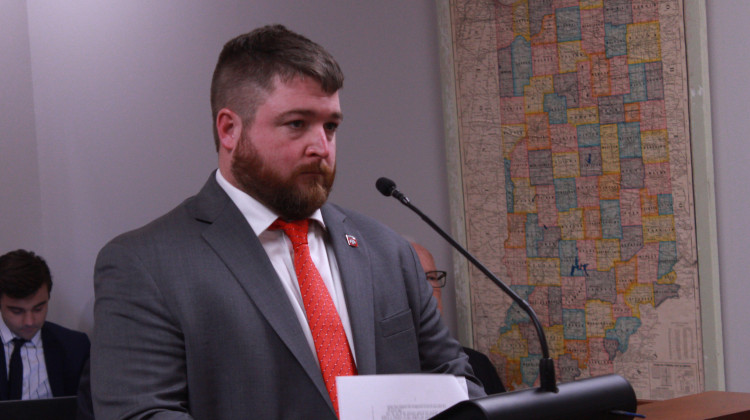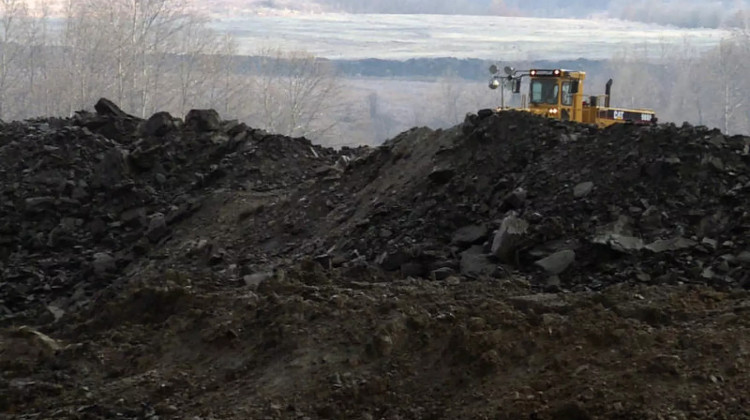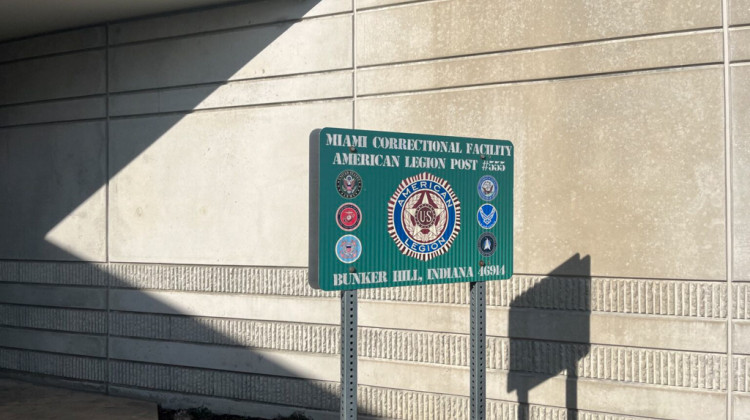
A group of union workers from UPS facilities across Indiana and neighboring states listen as organizers present on the contract negotiation process.
Adam Yahya Rayes/IPB NewsThere are less than two months left for the international Teamsters union and UPS to negotiate new contracts for workers as current agreements expire.
With the possibility of a strike looming, a group of union workers from UPS facilities across Indiana and neighboring states gathered in Indianapolis to discuss the work that lies ahead.
“If we come to a strike, this meeting that we had organized here will bring us more so in unity and preparedness for that,” said Jeffery Hazzard, a driver for UPS in Muncie, in an interview after the meeting.
Teamsters members across Indiana and the country are voting this week on a strike authorization. If approved, the authorization won’t immediately kick off a strike. The vote just gives the union’s leadership the authority to call a strike at their “discretion” and “without additional approval if a new contract is not reached by or before” the end of July, according to a letter from International Brotherhood of Teamsters leadership to the union’s members.
The Teamsters’ leaders say they would prefer to avoid a strike, and Hazzard agrees – so long as they can get a strong contract without it.
“In fact, a strong vote authorizing your committee to call a strike can help prevent one from ever happening,” leadership wrote in the letter. “Your ‘yes’ vote sends a clear message to UPS that we are unified … and that we are all committed to winning the strongest possible contract for UPS Teamsters without compromise or concession.”
In an emailed statement, a spokesperson for UPS said the company “is focused on reaching a deal that is a win for our employees, the Teamsters, UPS and our customers – and we’re committed to doing that before the end of July.”
The company expects Teamster workers will “overwhelmingly approve” the authorization, according to the statement.
“This vote is a routine part of the bargaining process and does not mean that there will be a strike,” the spokesperson wrote. “We respect this step in the process and remain committed to making progress at the bargaining table.”
The union’s stated priorities for the new contract include wages and benefits – which is standard for most contract negotiations – alongside a host of other issues they want to see addressed, including better protection for drivers working in extremely hot conditions.
Hazzard recalled the difficulty of working in 90 degree weather recently. There is a fan in the vehicle he delivers packages in, but he said the fan “is blowing the heat and humidity just around.”
“I think they're going to have to change over to something more suitable for today's climate,” he said.
Hazzard said he would like to see delivery vehicles get air conditioning, but he’s unsure of whether that will be achieved in this contract.
The company said it's working to address the heat issue by partnering with various organizations to create “cooling sleeves and hats” for workers, “increasing access to ice, cool water and electrolytes beverages” and adding fans to vehicles and facilities.
Join the conversation and sign up for the Indiana Two-Way. Text "Indiana" to 73224. Your comments and questions in response to our weekly text help us find the answers you need on statewide issues.
The meeting, which primarily included “rank-and-file” Teamsters, was part of a larger union conference organized by Labor Notes, a labor advocacy organization that advocates for more worker-led or union member-led organizing and bargaining. Teamsters Local 135 sponsored the June 4 event, called a “Troublemakers School.”
During the meeting, workers from across the state discussed the issues they and the others who they work with want to see addressed.
“We’re the lowest paid drivers in town,” said one Indianapolis worker.
Others echoed that sentiment. Concerns about differing treatment and compensation across different tiers or categories of workers were also brought up.
A worker from Bloomington said their facility had issues with expectations to work extra hours. The workers have filed grievances about it, but the company can be slow to address those – a concern echoed by many of the other workers present.
Newly elected leadership in Local 135 has taken a stronger stance in negotiations with companies that employ its members, leading to two recent strikes. That aggressive stance is mirrored in the international union’s leadership.
A caucus within the union called Teamsters for a Democratic Union (TDU), pushed for more open union leader elections and championed the challenger candidates who ultimately beat out incumbent leaders. TDU and others argue those previous leaders had failed UPS workers during 2015 contract negotiations when they overruled a majority of those workers voting against the contract.
TDU organizer Rand Wilson co-led discussion during the Indianapolis meeting of UPS Teamsters.
“I know that if we make a lot of noise now about these issues it'll keep the pressure on the company to do something and the pressure on [the Teamsters] national negotiating committee [to address the issues in a contract],” Wilson said.
Part of the goal of the meeting was to give rank-and-file members the tools to communicate and advocate about the contract campaign to their coworkers. Wilson and his co-presenters laid out the “leverage” the union has in the upcoming negotiations.
Among other pressure points, Wilson pointed to an analysis by Chris Bohner, a union researcher and activist, which estimates UPS would lose $3.2 billion of operating profit in a 16-day strike and $6.2 billion in a 31-day strike.
The company’s profits already declined by 3.3 percent in the fourth quarter of 2022, to $3.8 billion, compared to the previous fourth quarter, according to a company earnings call. Though it still delivered one of the largest volumes of parcels in 2022, beaten only by the U.S. Postal Service.
“Competitors like FedEx, Postal Service and Amazon are not going to be able to handle that volume [if UPS workers strike],” Wilson said. “It's going to cripple the country's economy, in a nutshell. That's our leverage.”
At the meeting, the workers also estimated, to the best of their ability, how ready colleagues in their facilities would be for a potential strike. Many said they feel they are very prepared, but others saw challenges ahead.
Some attendees said they had concerns about how much money co-workers were saving, which might affect their ability to withstand a longer strike at the lower pay they would receive from the union strike fund.
Some worried workers on different shifts or in different roles may be too disconnected from one another. And some were concerned about Indiana's “right-to-work” law, which makes it possible for some workers at each facility to not be full, dues-paying members of the union but still get the same protections from the contracts negotiated by the union.
“A part time pre-loader doesn't feel that he can sympathize with a driver. The driver doesn't feel like they could sympathize with a part-timer because the driver is full-time,” Hazzard, the UPS driver from Muncie, said. “And so that that separation brings about apathy. … It’s by design, I would say.”
After discussing these opportunities and potential roadblocks, TDU organizers separated the workers by facility and sat down with them to help them discuss tactics they can use to ensure their union co-workers are all informed and encourage them to take a larger role.
This included tips like having multiple people be responsible for communicating updates, so that people are not only getting information in large blasts from union leaders – they’re getting them from coworkers too. And, if more people do the communicating, each can be responsible for reaching fewer people.
Hazzard said he felt like the tools he gained from the meeting will make it easier to bring his coworkers together.
“We’re trying to let them know what is going to take place if a strike occurs,” Hazzard said. “We're going to try to find out if we can get them the information as needed and required for the strike. And no one wants a strike, but we just need preparedness.”
Adam is our labor and employment reporter. Contact him at arayes@wvpe.org or follow him on Twitter at @arayesIPB.
9(MDAyMzk1MzA4MDE2MjY3OTY1MjM5ZDJjYQ000))
 DONATE
DONATE






 Support WFYI. We can't do it without you.
Support WFYI. We can't do it without you.